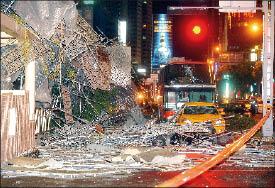Suggesting that sudden strong gusts of wind might have been behind the collapse of scaffolding at the Splendor Hotel (台中金典酒店) in Greater Taichung on Friday night, a Council of Labor Affairs (CLA) official yesterday said the true cause of the accident could not be ascertained until the completion of an investigation report, which is slated to be released tomorrow.
A large amount of scaffolding, which was erected along the facade of the five-star hotel for remodeling work, collapsed on Friday at 6:45pm. About 60 tonnes of scaffolding fell on both Jiansing Road and Taichung Harbor Road — the intersection on which the hotel is located — in the city’s West District (西區), injuring 12 people and damaging 22 vehicles.
Among the injured, a woman surnamed Tseng (曾), 45, was still in critical condition as of press time.

Photo: Liao Yao-tung, Taipei Times
Lin Chin-chi (林進基), the head of the labor inspection department at the council, said yesterday that inspection officials had examined the site and that an investigation report is scheduled to be released tomorrow.
Initial assessments suggested that a sudden strong gust of wind at that time might have been the cause of the collapse, he said.
Lin said the Splendor Hotel would shoulder the responsibility if the process of the remodeling work is found to not have met construction standards.
Taichung Deputy Mayor Hsiao Chia-chi (蕭家旗) said the hotel had applied to remodel the bottom 10 floors of the hotel, adding that the Greater Taichung Government has since suspended construction work.
Yesterday morning, the city removed the collapsed scaffolding and traffic in the area could proceed as normal.
Splendor Hotel general manager Chen Yueh-feng (陳月鳳) said the hotel would take full responsibility and compensate all losses from the accident.

Right-wing political scientist Laura Fernandez on Sunday won Costa Rica’s presidential election by a landslide, after promising to crack down on rising violence linked to the cocaine trade. Fernandez’s nearest rival, economist Alvaro Ramos, conceded defeat as results showed the ruling party far exceeding the threshold of 40 percent needed to avoid a runoff. With 94 percent of polling stations counted, the political heir of outgoing Costa Rican President Rodrigo Chaves had captured 48.3 percent of the vote compared with Ramos’ 33.4 percent, the Supreme Electoral Tribunal said. As soon as the first results were announced, members of Fernandez’s Sovereign People’s Party

MORE RESPONSIBILITY: Draftees would be expected to fight alongside professional soldiers, likely requiring the transformation of some training brigades into combat units The armed forces are to start incorporating new conscripts into combined arms brigades this year to enhance combat readiness, the Executive Yuan’s latest policy report said. The new policy would affect Taiwanese men entering the military for their compulsory service, which was extended to one year under reforms by then-president Tsai Ing-wen (蔡英文) in 2022. The conscripts would be trained to operate machine guns, uncrewed aerial vehicles, anti-tank guided missile launchers and Stinger air defense systems, the report said, adding that the basic training would be lengthened to eight weeks. After basic training, conscripts would be sorted into infantry battalions that would take

GROWING AMBITIONS: The scale and tempo of the operations show that the Strait has become the core theater for China to expand its security interests, the report said Chinese military aircraft incursions around Taiwan have surged nearly 15-fold over the past five years, according to a report released yesterday by the Democratic Progressive Party’s (DPP) Department of China Affairs. Sorties in the Taiwan Strait were previously irregular, totaling 380 in 2020, but have since evolved into routine operations, the report showed. “This demonstrates that the Taiwan Strait has become both the starting point and testing ground for Beijing’s expansionist ambitions,” it said. Driven by military expansionism, China is systematically pursuing actions aimed at altering the regional “status quo,” the department said, adding that Taiwan represents the most critical link in China’s

EMERGING FIELDS: The Chinese president said that the two countries would explore cooperation in green technology, the digital economy and artificial intelligence Chinese President Xi Jinping (習近平) yesterday called for an “equal and orderly multipolar world” in the face of “unilateral bullying,” in an apparent jab at the US. Xi was speaking during talks in Beijing with Uruguayan President Yamandu Orsi, the first South American leader to visit China since US special forces captured then-Venezuelan president Nicolas Maduro last month — an operation that Beijing condemned as a violation of sovereignty. Orsi follows a slew of leaders to have visited China seeking to boost ties with the world’s second-largest economy to hedge against US President Donald Trump’s increasingly unpredictable administration. “The international situation is fraught